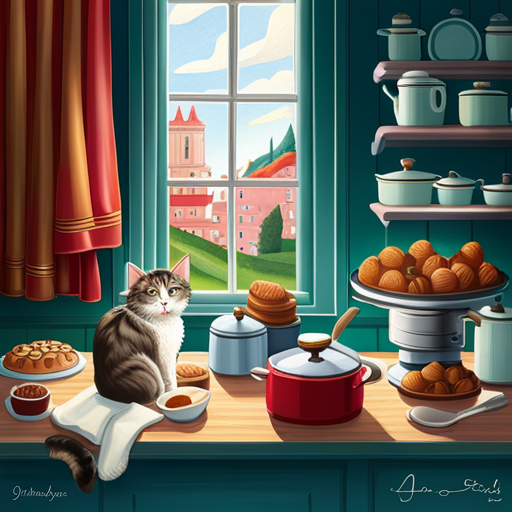Have you ever wondered if the theory that truffles could benefit your cat’s diet holds any truth? While these gourmet fungi are cherished by humans for their rich flavor, it’s crucial to question their safety and potential health impacts on feline friends.
Before you consider introducing truffles into your cat’s meals, it’s important to weigh the possible advantages against the risks. This discussion will guide you through understanding truffles’ nutritional value, recognizing potential hazards, and seeking expert opinions.
Are you ready to explore whether this luxurious treat is a wise choice for your cat?
Key Takeaways
- Fresh, preservative-free truffles are generally safe and nutritious for cats in moderation.
- Truffles can improve digestive health and support the immune system in cats.
- Consult a vet before introducing truffles, and monitor for allergies or adverse reactions.
- Serve raw, finely grated truffles sparingly as a treat, avoiding cooked or seasoned options.
Understanding Truffles
Before considering feeding truffles to your cat, it’s crucial to understand that truffles are a highly prized type of edible fungus, rich in nutrients but also potentially unfamiliar to a cat’s diet. Originating from several regions around the world, truffles have a complex growth process that’s intimately tied to their environment. They form symbiotic relationships with the roots of certain trees, making their cultivation methods quite unique and challenging.
Unlike other crops that you might be familiar with, truffles aren’t grown from seeds or spores that are simply planted in the ground. Instead, truffle cultivation involves inoculating the roots of host trees with truffle spores. These trees are then planted, and it takes years of careful soil management and patience before any truffles might appear. This intricate process contributes to their high value and rarity.
Understanding truffle origins and cultivation methods highlights the remarkable journey these fungi undergo before ending up in gourmet dishes or potentially in your cat’s bowl. Their nutritional richness comes from this unique growth process, making them a curious, albeit luxurious, addition to a diet.
Are Truffles Safe for Cats?
Having explored the unique cultivation and nutritional richness of truffles, it’s essential to examine whether these esteemed fungi are indeed safe for your cat’s consumption.
Truffles, known for their aromatic intensity and flavor impact, can be an intriguing addition to a cat’s diet. However, it’s crucial to understand their effects on feline health before introducing them to your pet.
Firstly, truffle preservation is a significant factor to consider. Fresh truffles, without any added preservatives or seasonings, are generally safe for cats in small amounts. However, processed truffles or products containing truffles might contain ingredients harmful to cats, such as onions, garlic, or excessive salt. Therefore, always opt for fresh, unseasoned truffles when considering them as a treat for your cat.
Moreover, while the flavor impact of truffles can be appealing, it’s important to introduce them to your cat’s diet gradually. Some cats might be sensitive to new foods, and a sudden introduction could cause gastrointestinal upset. Start with a tiny amount to see how your cat reacts before making it a regular treat.
Potential Health Benefits
You might wonder how truffles can benefit your cat’s health beyond their unique taste.
Research indicates that the nutritional content of truffles, including essential vitamins and minerals, supports overall well-being, improving digestive health and enhancing the immune system in felines.
Nutritional Content Analysis
Truffles, rich in essential nutrients, can offer several health benefits to cats, including improved digestion and enhanced immune system function. Different truffle varieties and cooking methods can influence their nutritional content, making them a potentially beneficial addition to your cat’s diet under the right circumstances. Here’s what you need to know:
- Protein Content: Truffles are a good source of high-quality protein, essential for your cat’s muscle development and maintenance.
- Antioxidants: They contain antioxidants that help protect your cat’s cells from damage, supporting overall health and well-being.
- Vitamins and Minerals: Truffles are packed with essential vitamins and minerals, including Vitamin C, phosphorus, sodium, and calcium, which contribute to strong bones and a healthy immune system.
Improved Digestive Health
One significant potential health benefit of incorporating truffles into your cat’s diet is the improvement of their digestive health, attributed to the high fiber content found in these gourmet fungi. Truffle cultivation has advanced, ensuring a steady supply of these nutritious delicacies.
High in fiber, truffles can aid in the smooth functioning of your cat’s digestive system. This can lead to fewer hairballs and constipation issues, common concerns among cat owners.
Moreover, feline preferences tend toward aromatic foods, making truffles an appealing choice. Their unique taste and smell might encourage pickier eaters to consume their meals, ensuring they receive the necessary nutrients for optimal health.
Including truffles in your cat’s diet could thus support digestive wellness while catering to their discerning palates.
Enhanced Immune System
Incorporating truffles into your cat’s diet may also bolster their immune system, thanks to the fungi’s rich antioxidant properties. These antioxidants are crucial for fending off free radicals, potentially reducing the risk of chronic diseases and supporting overall health. Here’s how truffles can benefit your cat’s immune system:
- Boosting Antioxidant Levels: Truffles are high in antioxidants, which help neutralize harmful free radicals in your cat’s body.
- Enhancing Vaccine Efficacy: A strong immune system can improve the response to vaccinations, offering better protection against diseases.
- Supporting Outdoor Activities: Cats with robust immune systems are more equipped to handle the challenges of the outdoors, from minor infections to various environmental stressors.
Recognizing the Risks
While truffles can offer some health benefits to your cat, it’s crucial to be aware of potential health hazards and the risk of allergic reactions. Studies have shown that some cats may develop digestive issues or allergic symptoms after consuming truffles, indicating that not all felines can tolerate these gourmet fungi.
Always consult with a veterinarian before introducing truffles into your cat’s diet to ensure they’re safe and suitable for your pet.
Potential Health Hazards
Feeding truffles to cats may introduce potential health hazards due to their unique digestive systems and nutritional needs. While truffles are a delicacy for humans, their impact on cats must be considered carefully. Here are three key risks:
- Truffle Toxicity: Not all truffles are safe for cats. Certain varieties can contain compounds that are toxic to felines, leading to gastrointestinal distress or worse.
- Cat Obesity: Truffles are rich in fats and, though a small amount mightn’t seem harmful, they can contribute to obesity in cats if fed regularly.
- Nutritional Imbalance: Cats require a diet high in animal protein. Substituting their regular food with truffles, even occasionally, can lead to nutritional deficiencies affecting their overall health.
Understanding these risks ensures you make informed decisions about your cat’s diet.
Allergic Reactions Risk
Another significant risk to consider is the potential for allergic reactions when cats consume truffles, as their bodies may not tolerate certain fungi. Just as humans can develop allergies to specific foods, including truffles, our feline friends are no different. Their immune systems might react negatively to proteins found in truffles, leading to symptoms like itching, swelling, or gastrointestinal issues.
Given this risk, it’s crucial to introduce truffles or any new food into your cat’s diet gradually and monitor for any adverse reactions. For those concerned about potential allergies but still wanting to offer their cat a gourmet experience, exploring truffle substitutes that are known to be safe for cats can be a wise choice. These alternatives can provide similar flavors without the risk of allergic reactions, ensuring your pet’s safety and well-being.
Serving Truffles to Cats
When serving truffles to cats, it’s crucial to ensure that the portion size is appropriate for their dietary needs. Truffles are a gourmet ingredient known for their unique flavors and are often considered a delicacy. They can be a safe treat for cats in moderation, but understanding the best way to serve them is key to maintaining your cat’s health and well-being.
Here are three important points to consider:
- Truffle Flavors: Not all truffles are created equal. Some truffles have intense flavors that mightn’t appeal to all cats. It’s best to start with a small amount to see how your cat reacts to the distinct taste.
- Cooking Methods: Serve truffles in their simplest form. Cooking or adding oils and seasonings can upset your cat’s stomach. Raw, finely grated truffles sprinkled over their regular food is an ideal way to introduce this gourmet treat.
- Portion Control: Cats have specific nutritional needs, and truffles should only be a minor part of their diet. A pinch of truffle once a week is more than enough to pamper your cat without disrupting their nutritional balance.
Alternatives to Truffles
While truffles are a luxurious treat, it’s essential to explore nutritious alternatives that cater to your cat’s health and dietary preferences. Mushroom substitutes offer a practical solution, blending cost considerations with the need for a balanced diet. Not all mushrooms are safe for feline consumption, but several types, such as shiitake, are known for their health benefits and are safe when cooked properly. Shiitake mushrooms, for instance, are rich in vitamins B and D, minerals, and amino acids, supporting your cat’s immune system and overall well-being without the hefty price tag attached to truffles.
Cost considerations are paramount when choosing alternatives. While truffles can be prohibitively expensive, mushroom substitutes like shiitake, button, or portobello offer similar textural experiences and nutritional benefits at a fraction of the cost. It’s crucial to cook these mushrooms thoroughly to avoid any digestive upset in your cat. Always introduce new foods gradually and monitor your cat’s response. Remember, while exploring alternatives, prioritize options that align with your cat’s nutritional needs, ensuring a diet that’s both healthy and enjoyable for them.
Expert Opinions
Turning our attention to expert opinions, it’s crucial to consider what veterinarians and feline nutritionists say about incorporating truffles or their alternatives into your cat’s diet. While truffles are a culinary trend, their inclusion in pet food requires careful consideration. Here are three key points from experts:
- Nutritional Value: Truffles, though not harmful, don’t offer significant nutritional benefits for cats. Cats require a diet high in protein, and truffles, primarily being fungi, don’t meet these dietary needs. Instead, they’re seen as more of a delicacy rather than a nutritional supplement.
- Truffle Sourcing: Experts emphasize the importance of responsible truffle sourcing. Due to their high cost and rarity, ensuring that the truffles are sourced sustainably and without harmful chemicals is vital. This ensures that if you do decide to share this delicacy with your cat, it’s safe and environmentally friendly.
- Culinary Trends vs. Dietary Needs: While it’s tempting to indulge our pets in the latest culinary trends, veterinarians advise focusing on their specific dietary needs. Cats thrive on a balanced diet tailored to their age, health, and lifestyle rather than human food trends.
Conclusion
In conclusion, while truffles aren’t toxic to cats, they don’t offer significant nutritional benefits for your feline friend. Interestingly, less than 1% of cats have ever tasted truffles, showing it’s a rarity in their diet.
It’s crucial to prioritize foods that meet their specific nutritional needs. Alternatives rich in protein and taurine are better suited for maintaining their health. Before introducing any new food, consult with a vet to ensure it aligns with your cat’s dietary requirements.

